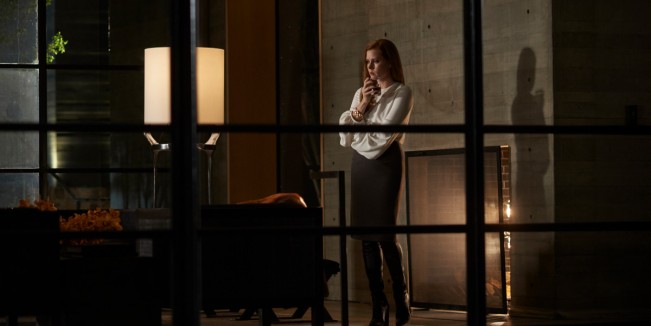By Jake Howell jake.howell@utoronto.ca
Toronto Review: Nocturnal Animals

Nocturnal Animals, the second feature from fashion designer-turned-director Tom Ford, opens with individual shots of four nude women, each in the rawest of slow motion, as they twirl and dance for the camera. The corpulent body types of these women are atypical for this style of burlesque, making their exposed skin and innumerable imperfections commentary for artist Susan Morrow (Amy Adams), a woman depressed in her second marriage to Hutton Marrow (Armie Hammer).
Susan’s installation of video nudes — and as we see later, comparisons to Rubens are appropriate — is at once open, spectacular, and brutally average in the sense of “average American.” Ford does not provide the artistic statement of Susan’s work, but her video art invites abstractions towards both the film’s title and its themes of indiscriminate ferality.
We are all mammals, Ford reminds us; we consume, we want, we lust. Laws and social contracts are simply constructs, and these ideals are done away with entirely in “Nocturnal Animals,” the diegetic thriller novel by Susan’s ex-husband Edward Sheffield (Jake Gyllenhaal). Edward sends his manuscript to Susan to show that after years of failing, he has made it as a writer (although as Ford stages Susan’s narrative, perhaps Edward’s intentions are more threatening than simple reconnection).
As Susan fitfully reads Edward’s novel — tossing in bed, gasping and removing her glasses, unable to put the book down — Ford cuts between Susan’s socialite ennui to the meta-fictional untamed highways of dusty rural Texas, where Tony Hastings (also Jake Gyllenhaal) is attacked by hyena-like hillbillies and suffers a tragic (and random) night of supreme loss. Helping Tony find closure on these crimes is Michael Shannon, attaining supporting actor perfection in a cancerous cop with nothing to lose.
Edward’s novel is frightening and upsetting, and as it comprises much of the film, we are locked into a state of nail-biting intensity punctuated only by Michael Shannon’s hilarious deadpan comedy. Yet Susan’s day-to-day is just as darkly humorous: when the iPhone of her assistant (Jena Malone) breaks in front of a mural that reads “REVENGE,” she shrugs and quips: “The new one comes out next week, anyway.” (Lines like these make me wonder if financiers read Tom Ford’s incredible script and felt the same magnetism Susan perceives in Edward’s writing.)
Finally, what is it about Jake Gyllenhaal in low-light that is so cinematically compelling?
In Nightcrawler, with gaunt skin stretched back for an effect that aged him dramatically, Gyllenhaal showed us his understanding of crepuscular. Prior to that role, with Prisoners, the actor displayed his ability to play a more traditional hero — a leading protagonist far different from the boy who was Donnie Darko.
It’s clear that Gyllenhaal, with his diverse filmography and career trajectory, is committed to topping himself over and over again. In Nocturnal Animals, he displays a heady mix of pathetic brilliance and fragile madness, distilling essentially the titles (and emotional ranges) of his previous films into something profoundly exciting. The actor feels winningly resistant to quick sketches of his “type,” or in-character allegiances, or whether or not his character is, well, vulnerable. Is he even the rank of actor that dies in movies? It’s a joy to toy with that question while we watch him, often as his eyes bug out of his head, in Tom Ford’s astounding thriller.













